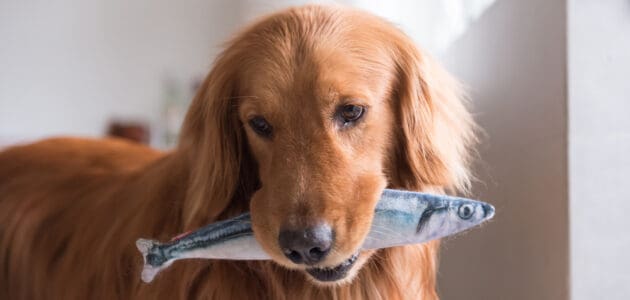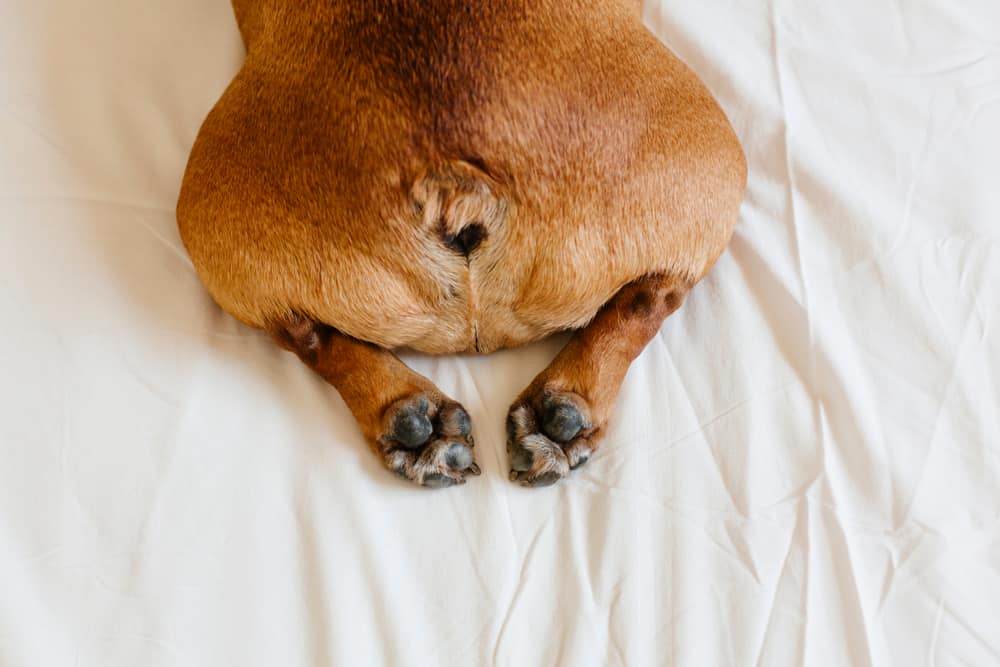Why Does My Dog Smell Like Fish?

From wolf to dog, our furry friends have adapted to be the perfect companions. They offer unconditional love, loyalty, and (though it may not always seem like it) are eager to follow our directions. However, there is one thing dogs and humans can’t see eye to eye on, and that’s smells.
Dogs seem to love the smell of anything we find utterly disgusting. Dogs have been known to roll around on dead animals or even on dung. So, if you start noticing a fishy odor coming from your dog, you may assume he rolled in something gross or maybe ate something nasty.
However, a fishy smell coming from your dog is often a sign that there is something wrong with his anal glands. Sometimes, they just need to be expressed, but other times, there are more serious issues that need to be addressed.
What Are Anal Glands?
All dogs, regardless of sex, have anal glands (also called anal sacs). These are two small sacs, one on each side of the anus. They contain a stinky, oily substance that usually comes out in your dog’s stool.
This substance provides a sort of signature — that is, its scent is unique to each dog. This is why dogs smell one another’s butts when they first meet. Dogs are interested in sniffing other dog’s droppings for the same reason.
Anal glands are naturally expressed when a dog defecates, but certain issues can prevent that from happening. When these sacs don’t empty naturally, they fill up and you’re often able to smell a fishy odor coming from your dog.
Anal Sac Disease
If your dog smells fishy, he technically has anal sac disease. This is a blanket term for all issues regarding the anal glands, and some such issues are more serious than others. Let’s talk about the different problems that fit under this umbrella.
Impactions
Your dog’s anal glands can become impacted. This means that, for whatever reason, the fluid within was not able to be expressed when your dog did his business. This caused the fluid to thicken into a paste-like consistency that now needs to be removed by a veterinarian because it can no longer be expressed naturally.
Anal sacs can become impacted for a few reasons: abnormalities in the sacs, loose stool, and even obesity. Loose stool is one of the most common causes of anal gland impactions. Soft stool does not put enough pressure on the glands for them to release naturally as they would if the stool was firm.
Impactions can be painful for dogs and can lead to even worse problems. The glands, clogged with thickened secretions, become the perfect environment for bacteria to grow. Normally, bacteria in the anal sacs is flushed out during defecation, but once they are impacted, both bacteria and anal gland secretions are trapped. If nothing is done, this will lead to infection.
Vets treat impacted anal glands by expressing them manually. They may also prescribe antibiotics if there are any signs of infection.
Abscesses and Infections
If you don’t catch your dog’s anal gland issues soon enough, impactions can turn into infections and abscesses. The bacteria trapped in the anal sacs flourishes, causing infection. The thickened anal fluid becomes bloody and the sacs fill with pus. At this point, they are referred to as abscessed.
Abscesses are also quite painful and you may be able to identify them yourself. Often, one of both sides of the dog’s anus will appear red and swollen. If not treated, the abscesses can burst, releasing greenish-yellow, bloody pus. Not only that, but the infection may also spread and cause damage to the anus and rectum.
This is why it is important to promptly make an appointment with the vet if your dog smells like fish. Waiting too long will cause your dog more discomfort and could increase the severity of the problem. Infections are typically treated with antibiotics, and depending on the severity, the veterinarian may also flush out the dog’s anal glands.
Tumors
It is possible for tumors to form on the anal glands, though they are relatively uncommon. Tumors inhibit the glands from expressing at all, leading to impactions. These tumors can be either cancerous or benign, with cancerous versions having the potential to spread to other parts of the body.
If your dog has a tumor on his anal glands, in most cases, it will have to be surgically removed. Sometimes, the vet may also recommend the removal of the anal glands themselves.
Symptoms

Aside from the fishy smell, there are some other symptoms of anal sac disease you should pay attention to. However, if your dog smells fishy but has none of these symptoms, you should still take them to the vet!
Dogs experiencing discomfort due to their anal glands will often scoot their rear-ends across the floor. It looks pretty silly, but it’s a good indication that there is a problem.
You may also see your dog licking or biting at the base of his tail. If you attempt to touch this area, your dog may growl at you because of the discomfort. If he does allow you to touch his tail, he may yelp. Similarly, dogs may experience pain or difficulty defecating.
Remember how we explained that abscesses can burst? If this happens, you will likely see blood or pus coming out of the rectum. Hopefully, though, you’ll be able to recognize the other symptoms and get your pooch to the vet before this occurs.
Prevention
If you’ve had to take your dog to the vet for anal gland issues even once, then it’s time to work on prevention. Not only will prevention save you money and time, but most importantly it’ll save your dog from the discomfort of impacted or infected anal sacs.
Unfortunately, preventative methods are not guaranteed to keep your dog from experiencing anal sac disease. However, they should lower the chances. The best prevention includes diet and exercise.
Diet
If your dog has allergies or other intolerances, he is more likely to suffer from diarrhea. Once you find the right diet, your dog’s stool will firm up and the risk of anal sac disease will decrease.
Of course, even dogs without dietary issues can have loose stool. You may find that they simply don’t do well on the brand of food you’ve chosen and switching can solve the issue. Choosing a high fiber diet can help, and you can talk to your vet about prescription diets if necessary.
You should also make sure your dog has access to plenty of fresh, clean water. Dehydration can affect stool quality, so it’s important that your dog stays hydrated.
Exercise
Exercise is equally important to diet because obese dogs have a higher likelihood of anal aac disease. Therefore, exercise is fundamental in helping a dog reach and maintain a healthy weight. Not only that, but exercise also helps the anal glands express naturally.
Other Reasons Your Dog May Smell Like Fish
Anal sac disease is the most common reason your dog would smell like fish, which is why we’ve spent so long talking about it. However, if that fishy smell doesn’t seem to be coming from your dog’s rear end, then there may be a different issue at play. Therefore, we’d like to briefly go over some of the other reasons why your dog may smell like fish.

Stinky Breath
If your dog’s breath smells fishy, it might be nothing more than stinky breath due to plaque and tartar build-up. Just like humans, dogs’ teeth need to be brushed regularly.
If you brush your dog’s teeth and their breath does not improve, then it could be a sign of an underlying condition such as diabetes, kidney disease, or decaying teeth. You’ll want to schedule an appointment with your vet.
Urinary Tract Infection (UTI)
If your dog’s urine smells like fish then it could be a sign of a urinary tract infection. Despite the fact that we are of different species, a dog’s urine should still smell similar to our own. If the dog’s pee doesn’t smell like pee, there’s a problem.
Other symptoms of UTIs include frequent urination, straining to urinate, pain during urination, dripping urine, and frequent licking of the genitals. In some cases, dogs may even urinate blood.
Vaginitis
If you recognize a foul odor coming from your female dog and you’re sure it isn’t coming from her anus, it could be a sign of vaginitis. Vaginitis is the inflammation of the vagina. Both spayed and intact females can suffer from it.
Other symptoms of vaginitis include vaginal discharge, increased frequency of urination, redness, swelling, and licking, scooting, or rubbing of the vaginal area.
Fear and Stress
If you have a dog that becomes excessively anxious or stressed, he may express his anal glands when overwhelmed. Though this is a bit stinky and gross, it is normal. There is nothing physically wrong with your dog. However, you may want to work with an animal behaviorist using methods like counter-conditioning to help your dog overcome his fears.
Farewell Fishy Fido
Now that you know the potential causes behind your dog’s aquatic stench, you’ll soon be saying farewell to a fishy-smelling Fido. After some treatment from the vet, Fido will be back to smelling like Fritos and wet dog.
Hopefully, the fish smell will allow you to catch your dog’s anal gland issues before they get too serious. Don’t wait to see your vet, or impacted anal glands could become infected. In the worst-case scenario, your dog’s anal sac disease may be caused by a tumor that will require surgical removal.
There’s no sure-fire way to 100% prevent anal sac disease, but there are things you can do to help. Make sure your dog’s diet results in firm stools and provide appropriate amounts of exercise and plenty of water. Hopefully, your dog’s anal sac disease will be a one-time thing.




